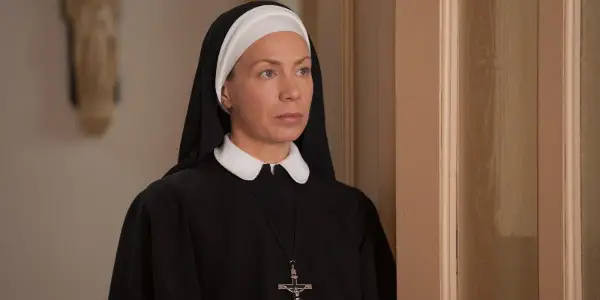Boarding school dramas have always fascinated me, especially those with all female casts. I’m thinking of films like Madchen in Uniform, Olivia, Cracks, A Little Princess and The House That Screamed. Although all very different from one another, these films offer glimpses into life before womanhood sets in and all the growing pains that come with this journey. Léa Pool’s The Passion of Augustine is no different.
Like so many before it, this film focuses its attention on an insular community of women encircled by the rigidity of religion, education, and societal expectation. Through this limited lens, audiences are forced to confront what it means to be a woman in this world, both at present and in the past, and consider how much has truly changed in the face of progress.
The Passion of Augustine follows the story of Mother Augustine (Celine Bonnier), the head of a rural Quebec convent school in the late 1960’s. Augustine, who is a talented pianist, prides herself on teaching her young charges to express their passions with music. But not everyone in her congregation sees eye-to-eye. Augustine’s reliance on music is frequently met with scoffs and complaints, but none of that stops her from charging forward. As secularization threatens to put her convent in jeopardy, Augustine uses music to unite the convent and combat inevitable change.
Religion vs. Money and Secularization
Unfortunately for Augustine, her passion for music education is far too expensive for her congregation to maintain and no one is particularly happy about it. It’s the sixties, after all. In the era of sex, drugs, and rock-and-roll, who needs classical training anyway?

While this seems like a simple enough problem to fix, the film puts into perspective the life-altering question of that era: Are Catholic ideals worth upholding or should everyone just “get with the times”? It’s this question that drives the film forward and prompts each character to contemplate how they’ll navigate the new and changing world outside the convent.
Nuns Can Put Up a Fight, Too
One of the film’s many strengths is that it presents Augustine, her fellow nuns, and her young students as tenacious and always ready to take a stand. No matter the obstacle in their way, they speak up for what’s right, what’s important to them, and that which benefits their entire community.
As a viewer and as someone who relishes in women’s stories on screen, the persistence of these characters moved me and made me truly root for them. I was delighted to see the cast of characters in this film presented as complex and incredibly human. We understand them to be women of great emotional strength and resolve; we also understand that, although they wear habits—or in the students’ cases, uniforms—they are just like you and I. Never are they reduced to tropes or cliches, nor are they dehumanized or simplified in any way.
Overall, I truly enjoyed the deep dive into what makes a convent school like this one so crucial for these girls and for the nuns who make everything happen behind the scenes.
On Loss and Identity
For me, the biggest takeaway from the film is that, in the face of loss (in this case, the convent and religious ideals), one’s identity can never truly be taken away from them. Although everyone at Augustine’s school is torn between the religious and secular worlds, each character is true to who they are.
Augustine always remains driven, compassionate, and kind-hearted even when the world she’s known for so long demands that she change. And Augustine’s students, particularly her niece Alice (Lisandre Menard), constantly fight against their worldly urges to retain their sense of innocence. Each time they confront difficult situations, they’re brought back into the religious fold by Augustine who is determined to keep them from the kinds of mishaps and mistakes she fell victim to as a young girl.
In Sister Lise (Diane Lavallee), we see the other side of the coin. She’s entered religious life to free herself from societal pressures. With secularization now lurking in every corner, she’s being asked to relinquish the order, identity, and ideals she’s grown so accustomed to. In the end, despite shedding her habit for more secular clothing, she never stops being the person she understands herself to be—which tells us that our identities are ingrained in us; they aren’t chosen paths. It’s a reaffirming message to us all that we are who we are no matter the changes our world is facing. No one person or circumstance can take that away from us.
The Passion of Augustine: Conclusion
At its core, The Passion of Augustine is so much more than a film about religion, nuns, or Catholic school. It shows us what it means to stand up for what you love, and challenges archaic and often false perceptions of religious institutions. The film allows us to understand Augustine’s world through her eyes. We see firsthand how music soothes the soul and why you should never underestimate a passionate group of women on a mission.
The Passion of Augustine is now available on VOD.
https://www.youtube.com/watch?v=9bu9BbhNDf0Does content like this matter to you?
Become a Member and support film journalism. Unlock access to all of Film Inquiry`s great articles. Join a community of like-minded readers who are passionate about cinema - get access to our private members Network, give back to independent filmmakers, and more.